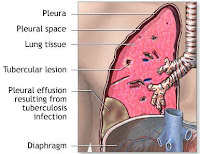
Mesothelioma symptoms are not specific to the disease; that is, many mesothelioma symptoms are also symptoms of other medical problems. Most studies show that the symptoms of mesothelioma usually begin to appear 30 to 40 years after exposure to asbestos. Thus, many mesothelioma patients are unaware that the symptoms they are experiencing are related to something that happened much earlier in their lives. This allows the disease to further progress, which is one reason most patients’ mesothelioma prognosis is very grim. Even a short period of asbestos exposure (as little as a few months) can create the conditions for a disease that erupts much later in life.
Mesothelioma affects the lining of various cavities in the body. Over time, the growth of cancerous tumors causes these tissues to expand and gather fluid. The presence of excess fluid is typically what causes the symptoms to occur. Mesothelioma symptoms also depend on the location of the tumors.
Common signs and symptoms of Mesothelioma include:
* A cough that does not go away
* Chest pain, often aggravated by deep breathing
* Hoarseness
* Weight loss and loss of appetite
* Bloody or rust-colored sputum (spit or phlegm)
* Shortness of breath
* Fever without a known reason
* Recurring infections such as bronchitis and pneumonia
* New onset of wheezing
* When Mesothelioma spreads to distant organs, it may cause:

* Bone pain
* Neurologic changes (such as weakness or numbness of a limb, dizziness)
* Jaundice (yellow coloring of the skin and eyes)
* Masses near the surface of the body, due to cancer spreading to the skin or to lymph nodes (collection of immune system cells) in the neck or above the collarbone.
A. Pleural Mesothelioma Symptoms
Some of the symptoms of pleural mesothelioma (mesothelioma cancer of the lung lining) include:
pain in the lower back or the side of the chest
shortness of breath
a persistent cough
difficulty swallowing food
fever and sweating
fatigue
weight loss.
These symptoms are also common to many minor ailments and, therefore, may not cause a doctor to suspect mesothelioma.
Pleural Effusion-fluid in the Lungs
One of the most common and specific symptoms of pleural mesothelioma is the accumulation of fluid between the lungs and chest cavity. This generally causes shortness of breath, and requires a doctor to drain the fluid, called fine-needle aspiration, to make breathing easier and relieve chest pain. This symptom is more unique to mesothelioma, making it more likely that you may have the disease.
B. Peritoneal Mesothelioma Symptoms
Symptoms of peritoneal mesothelioma (abdominal mesothelioma - mesothelioma of the lining of the stomach) include:
stomach pain
nausea and vomiting
weight loss.
Like pleural mesothelioma, these symptoms are also common to many minor ailments and, therefore, may not cause a doctor to suspect mesothelioma.
No comments:
Post a Comment